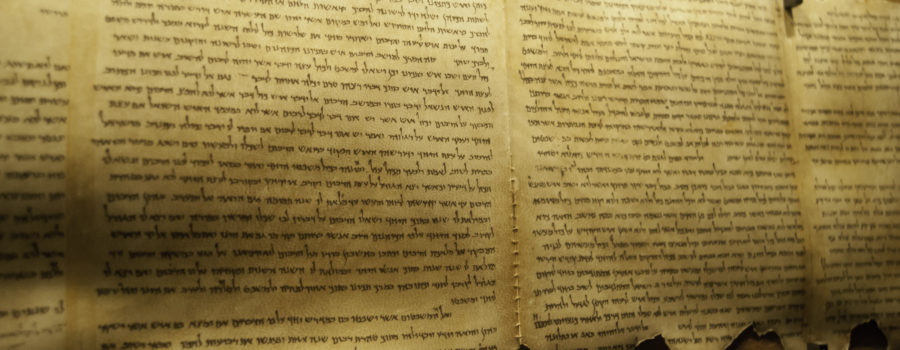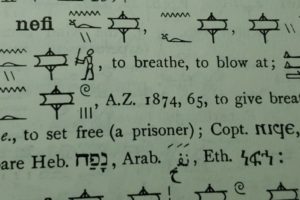When Lechi and his party left Jerusalem for the Land of Promise, they brought with them a version of the Tanakh, known as the “Plates of Brass.” Concerning these Brass Plates we read in The Stick of Joseph:
For behold, Lavan has the record of the Y’hudim and also a genealogy of your forefathers, and they are engraved upon plates of brass. (1 Nefi 1:10)
And behold, it is wisdom in Elohim that we should obtain these records that we may preserve unto our children the language of our fathers, and also that we may preserve unto them the words which have been spoken by the mouth of all the holy prophets, which have been delivered unto them by the spirit and power of Elohim since the world began, even down unto this present time. (1 Nefi 1:12)
Yes, and I also thought that they could not keep the mitzvot of YHWH according to the Torah of Moshe except they should have the Torah. And I also knew that the Torah was engraved upon the plates of brass. And again, I knew that YHWH had delivered Lavan into my hands for this cause, that I might obtain the records according to his mitzvot. (1 Nefi 1:17)
And he beheld that they did contain the five books of Moshe, which gave an account of the creation of the world and also of Adam and Havah who were our first parents, and also a record of the Y’hudim from the beginning, even down to the commencement of the reign of Tzidkiyahu, king of Y’hudah, and also the prophecies of the holy prophets from the beginning, even down to the commencement of the reign of Tzidkiyahu, and also many prophecies which have been spoken by the mouth of Yirmeyahu. (1 Nefi 1:22)
And I beheld a book, and it was carried forth among them. And the angel said unto me, Do you know the meaning of the book? And I said, I know not. And he said, Behold, it proceeds out of the mouth of a Y’hudi — and I, Nefi, beheld it. And he said unto me, The book that you behold is a record of the Y’hudim, which contains the covenants of YHWH which he has made unto the house of Isra’el; and it also contains many of the prophecies of the holy prophets. And it is a record like unto the engravings which are upon the plates of brass, except there are not so many. Nevertheless, they contain the covenants of YHWH which he has made unto the house of Isra’el; wherefore, they are of great worth unto the Goyim.… (1 Nefi 3:21)
Several excerpts from the Brass Plates appear in The Stick of Joseph, most notably, several complete chapters from the book of Isaiah. These Isaiah excerpts are uniquely interesting because they show clear signs of descending from the ancient scribal tradition of the Book of Isaiah. In some cases, the Brass Plates versions of Isaiah differ from the standard Masoretic text found in modern Bibles. These differences appear to reveal demonstrable scribal errors in the current Biblical text, and in many cases have parallels, to one degree or another, in other ancient witnesses, such as the Greek Septuagint, the Aramaic Peshitta Tanakh and even the Dead Sea Scrolls. In other words, when the Brass Plates version differs from the Masoretic (Biblical) text, the Brass Plates version often proves to match other ancient sources better than the current Biblical text does.
The following analysis of various verses demonstrates the relationship between the Brass Plates and the Ancient Isaiah Scribal tradition.
Isaiah 2:16 (2 Nefi 8:6)
Masoretic Text: “and upon all the ships of Tarshish,…”
Greek Septuagint: “and upon all the ships of the sea…”
Brass Plates: “and upon all the ships of the sea, and upon all the ships of Tarshish…”
In this verse of Isaiah (Isa. 2:16) there is a variant reading between the reading of the Masoretic Text, which has “ships of Tarshish” and the Hebrew text underlying the Greek Septuagint, which reads “ships of the sea.” The Plates of Brass version contains both readings. This may be an example of what is called in textual criticism “conflation.” Conflation occurred when a scribe had two or more manuscripts in front of him that contained conflicting readings, and so he included both of them in his copy.
Alternatively, the Plates of Brass might express the original reading, and the readings of the Masoretic Text and the Septuagint could represent two separate instances of the scribal error known in textual criticism as “haplography,” in which a scribe’s eye skips from a word or phrase to a similar or identical word or phrase, inadvertently omitting the text in between. (This is less likely because it would require two scribal errors instead of just one.) In either case, this reading demonstrates that the Plates of Brass are an authentic source for the ancient textual tradition of Isaiah.
Isaiah 2:21 (2 Nefi 8:7)
Masoretic Text: “…and for the glory of his majesty, when he arises to shake terribly the earth.”
Septuagint: “…glory of his might, when he shall arise to smite (θραυσαι) the earth.”
Peshitta: “…glory of his majesty, when he arises to subdue (למכבשו) the earth.”
Brass Plates: “and the majesty of his glory shall smite them, when he arises to shake terribly the earth.”
In this verse of Isaiah (Isa. 2:21), the Plates of Brass has “and the majesty of his glory shall smite them, when he arises to shake terribly the earth.” The Masoretic Text omits “shall smite them.” The Septuagint has “…glory of his might, when he shall arise to smite (θραυσαι) the earth.” The Aramaic Peshitta has “…glory of his majesty, when he arises to subdue ( למכבשו ) the earth.” Where the Brass Plates version differs from the Masoretic text, it matches the Septuagint and parallels the Peshitta.
Isaiah 13:3 (2 Nefi 10:2)
Masoretic Text: “… I have also called my mighty ones for my anger, even them that rejoice in my highness.”
Brass Plates: “… I have also called my mighty ones, for my anger is not upon them that rejoice in my highness”
The 2 Nefi reading of “my anger is not upon them that rejoice in my highness” must have read לא אפי על עליזי גאותי. The Masoretic Text appears to reflect a scribal error with the similar-appearing text לאפי עליזי גאותי “mine anger, [even] them that rejoice in my highness.” With the two versions aligned, the potential error is readily seen:
לא אפי על עליזי גאותי
לאפי עליזי גאותי
Isaiah 14:11 (2 Nefi 10:5)
Masoretic Text: “… and the noise of thy viols…”
Peshitta: “[the noise of] your viols is dead” (ומית כנרן)
Brass Plates: “the noise of your viols is not heard”
The Plates of Brass have “the noise of your viols is not heard” whereas the Masoretic Text omits “is not heard”. The Aramaic Peshitta text agrees closely with the Brass Plates with the reading “[the noise of] your viols is dead” (ומית כנרן).
Isaiah 48:6 (1 Nefi 6:2)
Masoretic Text: “You have heard, see all this…”
Septuagint: “You have heard and seen all this…”
Peshitta: “You have heard and seen all this…”
Brass Plates: “You have heard and seen all this…”
In this verse of Isaiah (Isa. 48:6), the Plates of Brass reading “You have heard and seen” agrees with both the Septuagint and the Aramaic Peshitta text against the Masoretic text, which has “You have heard, see….” This agreement demonstrates that the Plates of Brass are an authentic source for the ancient textual tradition of Isaiah.
Isaiah 48:11 (1 Nefi 6:2)
Masoretic Text: “…for how should my name be polluted?” (כי איך יחל)
Peshitta: “that [my name] be not polluted” (דלא אתטושי ) (Hebrew: כי לא יחל )
Brass Plates: “for I will not allow my name to be polluted.”
In this verse of Isaiah (Isa. 48:11) the Plates of Brass agree with the reading of the Peshitta Aramaic text of Isaiah “that [my name] be not polluted” (Aramaic: דלא אתטקשי) (Hebrew: כי לא יחל) against the Hebrew Masoretic Text, which has “for how should [my name] be polluted” (כי איך יחל). This agreement yet again demonstrates that the Plates of Brass are an authentic source for the ancient textual tradition of Isaiah.
Isaiah 48:14 (1 Nefi 6:3)
Masoretic Text: “… which among them has declared these things? YHWH has loved him: he will do his pleasure on Babylon, and his arm shall be on the Chaldeans.”
Septuagint: “… who has told them these things? Out of love to you I have fulfilled your desire on Babylon, to abolish the seed of the Chaldeans.”
Brass Plates: “…and he will fulfil his word which he has declared by them; and he will do his pleasure on Babylon, and his arm shall be on the Chaldeans.”
In this verse of Isaiah (Isa. 48:14), the Plates of Brass reading “has declared these things unto them” agrees with the Septuagint reading of “has told them these things.” The Masoretic Text omits the word “them.” The word “fulfill” agrees with the reading of the Septuagint but is also omitted from the Masoretic Text. Yet another demonstration that the Plates of Brass are an authentic source for the ancient textual tradition of Isaiah.
Isaiah 50:2 (2 Nefi 5:6)
Masoretic Text: “… their fish stink, because there is no water, and dies for thirst.”
Septuagint: “…“their fish shall be dried up because there is no water.”
Brass Plates: “…their fish to stink because the waters are dried up.”
In this verse of Isaiah (Isa. 50:2), the Plates of Brass has the reading “their fish stink because the waters are dried up.” The Masoretic Text omits “dried up” and has only “their fish stink because there is no water.” The Septuagint has “their fish shall be dried up because there is no water.” The Brass Plates version most closely matches the Septuagint version of the text.
Isaiah 51:11 (2 Nefi 5:9)
Masoretic Text: “…and everlasting joy shall be upon their head.”
Septuagint: “…for blessing and joy shall come upon their head.”
Brass Plates: “…and everlasting joy and holiness shall be upon their heads…”
In this verse of Isaiah (Isa. 51:11), the Masoretic Text omits “holiness,” while the Septuagint has “blessing” (αγαλλιαματος) in place of “holiness.” The Brass Plates text agrees with both on the point of joy, but also includes the notion of holiness, paralleling the Septuagint “blessing.”
Isaiah 51:12 (2 Nefi 5:10)
Masoretic Text: “…who are you”
Septuagint: “…know/consider who you are”
Brass Plates: “…behold, who are you…”
In this verse of Isaiah (Isa. 51:12), “Behold” is omitted in the Masoretic Text, while the Septuagint has “know (or consider)” (γνωθι) in place of “Behold.”
Isaiah 53:11
Masoretic Text: “From the travail of his soul he shall see ___ he shall be satisfied in his understanding.”
Dead Sea Scrolls [1QIsa(a) & 1QIsa(b)]: “From the travail of his soul he shall see light he shall be satisfied in his understanding.”
Septuagint: “… from the travail of his soul, to shew him light, and to form him with understanding;”
When Avinodi quotes Isaiah 53:11 (presumably from the Brass Plates version of Isaiah) The Stick of Joseph follows the KJV, which follows the Masoretic text in this verse, omitting the word “light” (Moshiyah 8:5). Therefore, Avinodi’s statement matches the KJV.
However, when Avinodi goes on to comment upon the prophecy, he is clearly aware that the word “light” was in this passage, as he says:
And now, if Mashiach had not come into the world, speaking of things to come as though they had already come, there could have been no redemption. And if Mashiach had not risen from the dead, or had not broken the bands of death, that the grave should have no victory and that death should have no sting, there could have been no resurrection. But there is a resurrection; therefore the grave has no victory, and the sting of death is swallowed up in Mashiach. He is the light and the life of the world — yes, a light that is Eyn Sof, that can never be darkened, yes, and also a life which is Eyn Sof, that there can be no more death. (Moshiyah 8:14)
So it is likely that the word “light” was in the Brass Plates text of Isaiah 53:11, despite its absence in the direct quotation in Moshiyah 8:5.
Conclusion
These examples clearly demonstrate that the Brass Plates version of Isaiah, quoted extensively in the Stick of Joseph, is an authentic part of the ancient scribal textual tradition of the Book of Isaiah. The textual nature of the Brass Plates of the Book of Isaiah is well beyond the scope of Yosef ben Yosef’s education as a farm boy in the 18th century. Indeed, it’s highly unlikely, and in most cases impossible, that he could have even had access to these other textual variants of Isaiah in 1829. All this is once again a testimony to the authenticity of The Stick of Joseph as an ancient Jewish record.






1 Comment
Leave your reply.